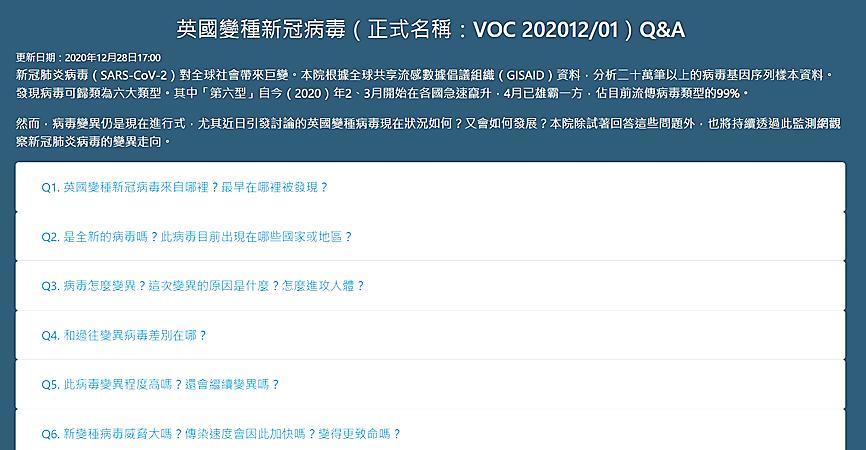In response to the emergence of reportedly more transmissible strains of COVID-19, Academia Sinica on Tuesday launched a real-time monitoring network to track the spread of different variants of the virus.
The new COVID-19 variant detected in the UK earlier this month was identified as having mutated from one of six dominant strains of the virus, according to the network’s Web site.
The UK variant is a sub-strain of the Type 6 variant of COVID-19, said a research team that comprises scientists from different fields, including Academia Sinica President James Liao (廖俊智).

Photo: Screengrab from the Academia Sinica Web site
The team used DNA sequences from the Global Initiative on Sharing Avian Influenza Data, a global science initiative and primary source that provides open access to DNA data on influenza viruses.
The Type 6 variant has since April become globally dominant, accounting for more than 95 percent of infections confirmed after mid-May, found a study published by the team in the US journal Proceedings of the National Academy of Sciences on Nov. 12.
The strain is defined by four single nucleotide variations that often co-occur, the team said, adding that other strains did not spread as efficiently, which suggests that COVID-19 is highly adaptable.
The UK mutation shows that the evolution of the virus cannot be easily stopped, Academia Sinica said.
The new network aims to facilitate the quick discovery of emerging variants and help assess vaccine efficiency, it said.
The network’s Web site can be visited at sarscov2.sinica.edu.tw/tracking.html.

Chinese spouse and influencer Guan Guan’s (關關) residency permit has been revoked for repeatedly posting pro-China videos that threaten national security, the National Immigration Agency confirmed today. Guan Guan has said many controversial statements in her videos posted to Douyin (抖音), including “the red flag will soon be painted all over Taiwan” and “Taiwan is an inseparable part of China,” and expressing hope for expedited reunification. The agency last year received multiple reports alleging that Guan Guan had advocated for armed reunification. After verifying the reports, the agency last month issued a notice requiring her to appear and explain her actions. Guan

GIVE AND TAKE: Blood demand continues to rise each year, while fewer young donors are available due to the nation’s falling birthrate, a doctor said Blood donors can redeem points earned from donations to obtain limited edition Formosan black bear travel mugs, the Kaohsiung Blood Center said yesterday, as it announced a goal of stocking 20,000 units of blood prior to the Lunar New Year. The last month of the lunar year is National Blood Donation Month, when local centers seek to stockpile blood for use during the Lunar New Year holiday. The blood demand in southern Taiwan — including Tainan and Kaohsiung, as well as Chiayi, Pingtung, Penghu and Taitung counties — is about 2,000 units per day, the center said. The donation campaign aims to boost

The Kaohsiung Tourism Bureau audited six hotels in an effort to prevent price gouging ahead of Korean band BTS’ concert tour in the city scheduled for Nov. 19, 21 and 22 this year. The bureau on Friday said that the audits — conducted in response to allegations of unfair pricing posted on social media — found no wrongdoing. These establishments included the local branches of Chateau de Chine, Hotel Nikko, My Humble House, and Grand Hai Lai, it said, adding that the Consumer Protection Commission would have penalized price gougers had the accusations been substantiated. The bureau said the Tourism Development Act

The Central Weather Administration (CWA) said a magnitude 4.9 earthquake that struck off the coast of eastern Taiwan yesterday was an independent event and part of a stress-adjustment process. The earthquake occurred at 4:47pm, with its epicenter at sea about 45.4km south of Yilan County Hall at a depth of 5.9km, the CWA said. The quake's intensity, which gauges the actual effects of a temblor, was highest in several townships in Yilan and neighboring Hualien County, where it measured 4 on Taiwan's seven-tier intensity scale, the CWA said. Lin Po-yu (林柏佑), a division chief at the CWA's Seismological Center, told a news conference